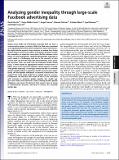| dc.contributor.author | Garcia, David | |
| dc.contributor.author | Mitike Kassa, Yonas | |
| dc.contributor.author | Cuevas, Angel | |
| dc.contributor.author | Cuevas, Ruben | |
| dc.contributor.author | Cebrian, Manuel | |
| dc.contributor.author | Moro Egido, Esteban | |
| dc.contributor.author | Rahwan, Iyad | |
| dc.date.accessioned | 2019-03-01T20:07:39Z | |
| dc.date.available | 2019-03-01T20:07:39Z | |
| dc.date.issued | 2018-07 | |
| dc.date.submitted | 2017-10 | |
| dc.identifier.issn | 0027-8424 | |
| dc.identifier.issn | 1091-6490 | |
| dc.identifier.uri | http://hdl.handle.net/1721.1/120700 | |
| dc.description.abstract | Online social media are information resources that can have a transformative power in society. While the Web was envisioned as an equalizing force that allows everyone to access information, the digital divide prevents large amounts of people from being present online. Online social media, in particular, are prone to gender inequality, an important issue given the link between social media use and employment. Understanding gender inequality in social media is a challenging task due to the necessity of data sources that can provide large-scale measurements across multiple countries. Here, we show how the Facebook Gender Divide (FGD), a metric based on aggregated statistics of more than 1.4 billion users in 217 countries, explains various aspects of worldwide gender inequality. Our analysis shows that the FGD encodes gender equality indices in education, health, and economic opportunity. We find gender differences in network externalities that suggest that using social media has an added value for women. Furthermore, we find that low values of the FGD are associated with increases in economic gender equality. Our results suggest that online social networks, while suffering evident gender imbalance, may lower the barriers that women have to access to informational resources and help to narrow the economic gender gap. Keywords: gender divide; Facebook; social media; inquality; development | en_US |
| dc.publisher | National Academy of Sciences (U.S.) | en_US |
| dc.relation.isversionof | http://dx.doi.org/10.1073/PNAS.1717781115 | en_US |
| dc.rights | Article is made available in accordance with the publisher's policy and may be subject to US copyright law. Please refer to the publisher's site for terms of use. | en_US |
| dc.source | PNAS | en_US |
| dc.title | Analyzing gender inequality through large-scale Facebook advertising data | en_US |
| dc.type | Article | en_US |
| dc.identifier.citation | Garcia, David et al. “Analyzing Gender Inequality through Large-Scale Facebook Advertising Data.” Proceedings of the National Academy of Sciences 115, 27 (June 2018): 6958–6963 © 2018 National Academy of Sciences | en_US |
| dc.contributor.department | Massachusetts Institute of Technology. Institute for Data, Systems, and Society | en_US |
| dc.contributor.department | Massachusetts Institute of Technology. Media Laboratory | en_US |
| dc.contributor.mitauthor | Cebrian, Manuel | |
| dc.contributor.mitauthor | Moro Egido, Esteban | |
| dc.contributor.mitauthor | Rahwan, Iyad | |
| dc.relation.journal | Proceedings of the National Academy of Sciences | en_US |
| dc.eprint.version | Final published version | en_US |
| dc.type.uri | http://purl.org/eprint/type/JournalArticle | en_US |
| eprint.status | http://purl.org/eprint/status/PeerReviewed | en_US |
| dc.date.updated | 2019-02-08T18:20:11Z | |
| dspace.orderedauthors | Garcia, David; Mitike Kassa, Yonas; Cuevas, Angel; Cebrian, Manuel; Moro, Esteban; Rahwan, Iyad; Cuevas, Ruben | en_US |
| dspace.embargo.terms | N | en_US |
| dc.identifier.orcid | https://orcid.org/0000-0003-2894-1024 | |
| mit.license | PUBLISHER_POLICY | en_US |

